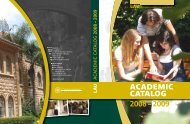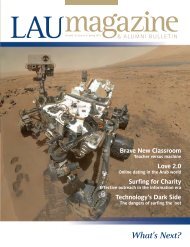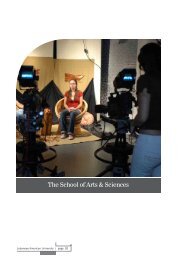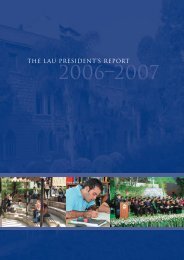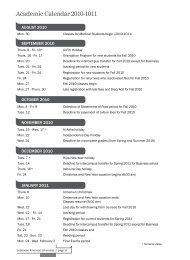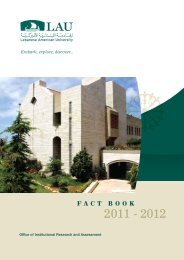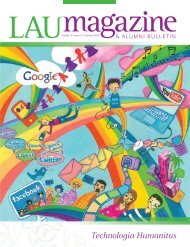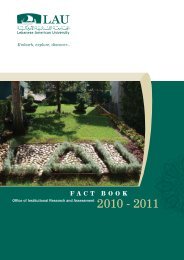academic-catalog2010.. - LAU Publications - Lebanese American ...
academic-catalog2010.. - LAU Publications - Lebanese American ...
academic-catalog2010.. - LAU Publications - Lebanese American ...
You also want an ePaper? Increase the reach of your titles
YUMPU automatically turns print PDFs into web optimized ePapers that Google loves.
Department of Computer Science and Mathematics<br />
BACHELOR OF SCIENCE (B.S.) IN<br />
MATHEMATICS EDUCATION<br />
Mission<br />
The Mission of the Mathematics Education<br />
Program is to prepare qualified and effective<br />
Mathematics educators to teach at all school<br />
levels, and to prepare students to pursue<br />
graduate studies in the field. The Program<br />
offers its graduates a strong foundation in the<br />
liberal arts and provides them with the ability to<br />
integrate educational theories in the teaching of<br />
mathematics.<br />
Educational Objectives<br />
The Program provides students with a sound<br />
foundation in mathematics, complemented with<br />
the education theories and methodologies that<br />
answer to the needs and recommendations of<br />
the local, public, and private, schools in content<br />
and philosophy.<br />
Graduates of the Mathematics Education<br />
Program at <strong>LAU</strong> will:<br />
1. Acquire knowledge in the different areas of<br />
both pure and applied mathematics.<br />
2. Be able to apply mathematical methods to<br />
science-related fields,as well as to real life<br />
situations.<br />
3. Gain an expertise in solving mathematical<br />
problems and in using Information Technology,<br />
primarily specialized mathematical software<br />
for teaching and research purposes.<br />
4. Be able to develop mathematics curricula<br />
for schools and to plan <strong>academic</strong> units,<br />
lesson plans, and activities for teaching<br />
math at all school levels.<br />
5. Be able to select, and implement<br />
appropriate strategies for teaching specific<br />
mathematical topics.<br />
6. Be able to plan strategies and to prepare the<br />
tools for assessing students’ achievement<br />
in mathematics.<br />
7. Be able to pursue professional development<br />
opportunities and/or higher-level studies<br />
in Math Education as lifelong learners.<br />
8. Have contacts with school students, teachers,<br />
and other professionals, through field<br />
experiences that include practice teaching.<br />
Learning Outcomes<br />
Graduates of the Mathematics Education program<br />
have the necessary skills and attitudes to enable<br />
them to meet the challenges of their profession<br />
with creativity, self-reliance, critical thinking and<br />
responsibility.<br />
Graduates of the program will:<br />
1. Have a mathematical strength that<br />
is grounded in the ability to reason<br />
mathematically, both formally and<br />
informally, and to solve challenging<br />
problems by building and/or using<br />
appropriate mathematical structures.<br />
2. Have the skills to communicate effectively<br />
and persuasively in their mathematical<br />
thinking in both written and oral forms.<br />
3. Have an appreciation for mathematical<br />
rigor and inquiry.<br />
4. Be able to encourage and guide the<br />
development of mathematical communication<br />
in their own (future) classrooms.<br />
5. Recognize through their own experiences of<br />
learning mathematics how they and others<br />
have built and utilized the rich connections<br />
among mathematical ideas. They will<br />
emphasize in their own classrooms, with<br />
peer students, the importance of building<br />
a useful connected understanding.<br />
6. Use various ways of representing<br />
mathematical ideas including verbal,<br />
graphical, numerical and symbolic to support<br />
and deepen mathematical understandings.<br />
7. Adopt technology as an essential tool<br />
for thoughtfully teaching, learning and<br />
understanding important mathematics.<br />
8. Construct mathematical models to solve<br />
practical and real life problems.<br />
9. Develop the ability to think logically and<br />
critically, and to analyze information in a<br />
mathematical setting.<br />
10.Develop the ability to teach students how<br />
to reformulate and solve problems in an<br />
abstract framework.<br />
11.Design positive and effective learning<br />
environments in their classrooms.<br />
The Mathematics Education degree requires<br />
a total number of 93 credits: 34 credits of<br />
Liberal Arts Curriculum requirements, 24 credits<br />
in Mathematics, 21 credits in Education, 6<br />
in Computer Science, and 14 credits of free<br />
electives. Furthermore, students can opt to do a<br />
Teaching Diploma, which consists of 21 credits to<br />
be taken over and above the Bachelor’s Degree<br />
requirements.<br />
<strong>Lebanese</strong> <strong>American</strong> University | page 116



